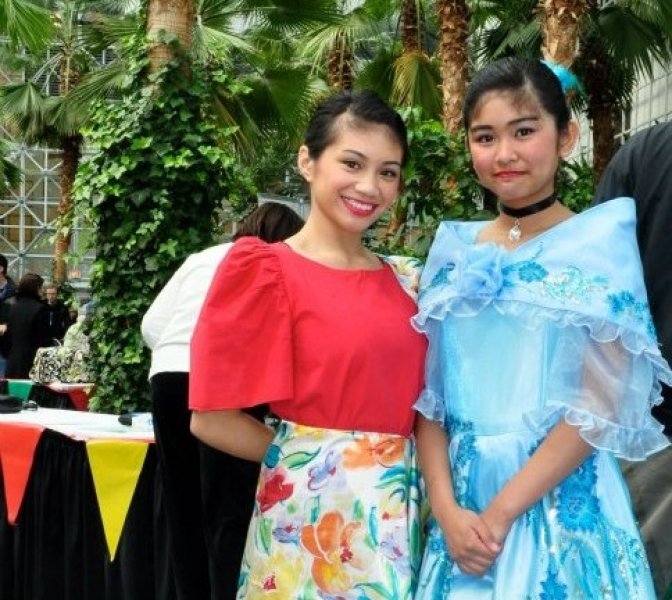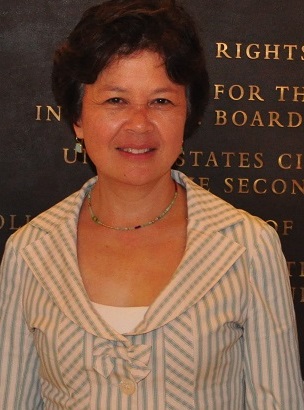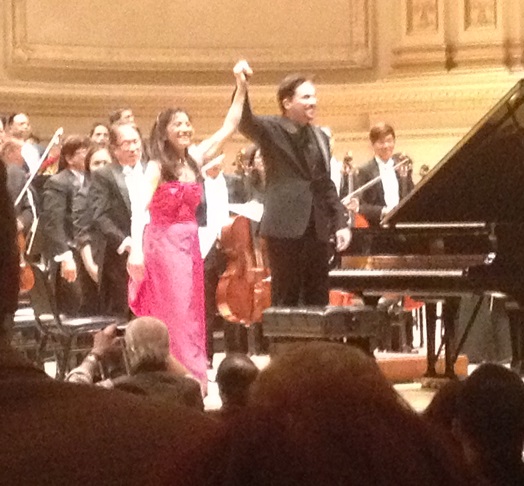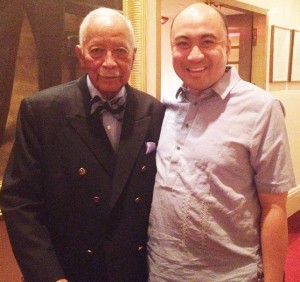Standing ovation for the Philippine Philharmonic Orchestra’s NYC debut
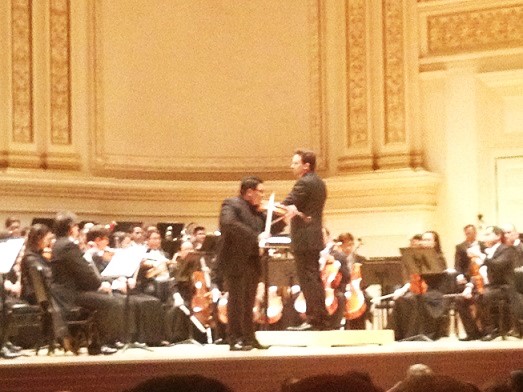
Violinist Diomedes Saraza and the PPO perform musical pieces by the great Finnish composer Jean Sibelius, as conductor Olivier Ochanine shapes the sound with his baton.
On a warm Saturday evening on June 18th, members of the New York Filipino American community turned up in multitudes to watch the Philippine Philharmonic Orchestra at the renowned Carnegie Hall. Many of us, including myself, have only heard about the PPO without ever having the chance to listen to their fine music. Until now.
I personally have only been to Carnegie Hall once, and to return here for this special occasion to see our own countrymen exhibit their musical talent in all its glory was truly meaningful. As I walked into my designated seat at the orchestra section, I could just sense the grandeur being emanated from the immense interior design of the Isaac Stern Auditorium and more importantly from the well-groomed PPO members who were already preparing their notes and instruments to fete us with an epic concert.
Soon, the orchestra conductor, Frenchman Olivier Ochanine, stepped onto the stage, signaling the start of the program. Before the music was to begin, we all spent a few seconds of silence in mourning and dedication to the victims of the recent mass shooting tragedy at an Orlando, Florida nightclub.
With the wave of his baton, conductor Ochanine opened the concert with the orchestra’s rendition of Russian composer Dmitri Shostakovich’s “Festive Overture, Op. 96,” a piece which was written in remembrance of the 37th anniversary of the Russian Revolution of 1917 which heralded the birth of the Soviet Union, and had its debut performance in Moscow in 1954 at the Bolshoi Theatre. In the following decades this piece would become a staple of Russian orchestral music, and was prominently featured in the 1980 Summer Olympics held in Moscow. I found the PPO’s rendition of this music to be meditative and relaxing, and was reflective of the orchestra’s inherent talent for playing classical European music for much of the evening.
The orchestra’s next elaborate musical piece was entitled “Violin Concerto in D minor, Op. 47” by Finland’s greatest composer Jean Sibelius, who lived from 1865 to 1957. He is widely credited to have helped his country forge a national identity during its struggle to gain political independence from Russia through the national inspiration derived from his music. One of the Philippines’ most gifted violinists Diomedes Saraza then walked onto the stage and dazzled the audience. Saraza brilliantly performed and conveyed the Scandinavian natural landscape and Norse mythology which have been underlying themes in Sibelius’s music. Saraza’s entire violin concerto truly bore a symphonic scope, and closing my eyes, I could imagine myself being taken back to the late Romantic period of modern European classical music.
The 20-minute intermission then began, and I found my way to the refreshments bar section near the auditorium, and got to briefly chat with fellow community columnist Marilyn Abalos, who shared her sentiment on how playing Sibelius was no simple task, yet we were both amazed and impressed how Saraza seemingly made it all look easy!
The second half of the concert began, and it was time for distinguished Philippine pianist Cecile Licad to display her innate skills on the ebony and ivory keys in high fashion during the program’s “Piano Concerto No. 2 in C minor, Op. 18,” composed by legendary Russian musician Sergei Rachmaninoff. His work has become some of the most celebrated among European classical music of the late 19th century-early 20th century. Watching Licad stroke those keys seemingly without flaw was nothing short of impressive, and I could just sense she has been a seasoned veteran at what she does for a very long time. Undoubtedly one artist with whom the Philippines can be extremely proud of, I was so happy for a couple of friends of mine who won VIP tickets to see this concert which also included a private dinner to personally meet Licad at the residence of philanthropist Loida Nicolas-Lewis.
For those of us wondering how could the PPO add a unique Philippine cultural flavor to their orchestra music, our questions were answered in the final music segment of the concert, “Philippine Portraits,” composed by the nation’s first and thus far only international conductor, the late Redentor Romero. “Philippine Portraits” wonderfully illustrated to us through the PPO’s harmonious music the scenic portrayal of the kaleidoscopic ethnic cultures and regional musical diversity of the Philippines. When one listens intently to this piece, you could hear how Eastern and Western instruments are intermingled with one another to express how the Philippines is a unique physical, cultural and social bridge between Asia and the West.
As this orchestral composition ended, just as we thought that the PPO couldn’t add a better Philippine cultural touch to their already impressive music, they then went on to serenade us a wonderful surprise delivery of the much beloved Filipino traditional ‘kundiman’ song “Gaano Ko Ikaw Kamahal.”
The concert concluded and my confidence in the future of the PPO’s global prominence was definitely assured, knowing that the financial proceeds of their fantastic orchestral performance will greatly contribute to the Philippine Disaster Relief Corporation’s shelter program for typhoon victims in the Philippines.
In attendance was my American friend, Paul Daniel, a lifelong New York resident and fan of classical music, who was impressed by the PPO. Inspite of his feelings on how the Rachmaninoff segment could have been improved upon, he was pleased with the overall performance of the group, particularly citing how the pieces by Shostakovich, Sibelius and Romero were well done.
Another friend of mine, Jan Andrada of Baguio City, commented on how Licad’s enchanting pieces blew her away and were fine examples of passion being communicated to the audience. The evening’s highlights for her was the “Philippine Portraits” segment which according to her, “brought us back in the days of our mothers putting us to sleep – ‘dandansuy’ and ‘pamulinawen,’ which is festive.” She further observed how the ‘kundiman’ finale was played beautifully by the PPO and made her reminisce about fairy tale weddings.
Noted in the audience was the former Mayor of New York David Dinkins, the city’s first and thus far only African-American mayor during the early 1990s, who is also a fan of the arts, Knowing that the PPO’s first Carnegie Hall concert was graced by the presence and support of a man of his stature is truly an honor and a sign of even more great things to come for this proud national orchestral group.


